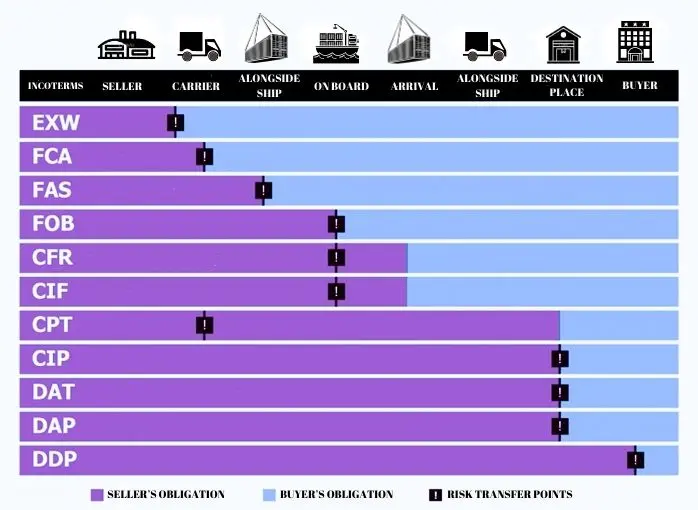Los Incoterms son, en esencia, términos entre compradores y vendedores. Estos términos dictan qué responsabilidades tienen el comprador y el vendedor durante una transacción. Esto incluye determinar quién paga el seguro, quién es responsable de pagar al transportista para transportar las mercancías y quién cubrirá los costos de los derechos y tasas de importación relacionados. La Cámara de Comercio Internacional (CCI) creó los Incoterms como una forma de ayudar a facilitar el comercio global saludable entre las naciones. Por lo tanto, los Incoterms son aceptados internacionalmente por todos los países.
Tipos de términos INCO
En la edición de 2010 se definen 11 Incoterms® distintos que sirven como reglas estandarizadas para el comercio internacional. Estos términos aclaran las responsabilidades de los compradores y vendedores en las transacciones que implican el envío de mercancías a través de las fronteras. Entre ellos, siete Incoterms se pueden aplicar a cualquier modo de transporte, mientras que cuatro están específicamente diseñados para el transporte marítimo. Comprender estos términos es fundamental para las empresas que participan en el comercio internacional, ya que dictan quién asume los costos y los riesgos en las distintas etapas del proceso de envío. A continuación, se presenta una descripción detallada de los 11 tipos de Incoterms® y las condiciones asociadas a cada uno.
Exhibición en el exterior
El término Ex Works (EXW) es uno de los Incoterms más favorables para el vendedor. En virtud de este acuerdo, la responsabilidad del vendedor es mínima; solo se le exige que ponga las mercancías a disposición para su recogida en sus instalaciones o en otro lugar especificado. Todos los costos y riesgos asociados con el envío, incluidos el transporte, el seguro y el despacho de aduanas, recaen íntegramente sobre el comprador. Esto significa que el comprador debe ocuparse de todo, desde la carga de las mercancías hasta su entrega en su destino final.
FCA- Transportista libre
De manera similar a EXW, el término Free Carrier (FCA) también favorece al vendedor. En este caso, el vendedor es responsable de entregar la mercancía a un transportista designado por el comprador en una ubicación específica. Una vez que la mercancía se entrega al transportista, el comprador asume la responsabilidad de todos los costos y riesgos posteriores asociados con el envío. Este término se utiliza a menudo cuando el vendedor tiene que organizar el transporte a una terminal o punto de carga cercano.
CPT- Transporte pagado hasta
En los términos de transporte pagado hasta (CPT), el vendedor asume una mayor responsabilidad que en los términos EXW y FCA. El vendedor paga el transporte de las mercancías hasta un destino específico, pero el riesgo se transfiere al comprador una vez que las mercancías se cargan en el vehículo de transporte en el origen. Esto significa que, si bien el vendedor cubre los costos de envío, el comprador asume el riesgo de pérdida o daño durante el tránsito.
CIP- Transporte y seguro pagados hasta
El término "Transporte y seguro pagados hasta" (CIP) es similar al CPT, con la diferencia clave de que el vendedor también es responsable de obtener un seguro para las mercancías durante el tránsito. Si bien el vendedor cubre los costos de transporte y el seguro, el riesgo se transfiere al comprador una vez que las mercancías se cargan en el origen. Este término proporciona una capa adicional de protección para el comprador, ya que puede estar seguro de que las mercancías están aseguradas durante el transporte.
DPU- Entregado en el lugar de descarga
Anteriormente conocido como Entregado en terminal (DAT), el término Entregado en lugar descargado (DPU) coloca la máxima responsabilidad en el vendedor. El vendedor tiene la tarea de entregar las mercancías en un destino específico y es responsable de descargarlas. El vendedor asume todos los riesgos y costos hasta que las mercancías se descargan en la ubicación del comprador, lo que hace que este término sea muy ventajoso para los compradores.
DAP - Entregado en el lugar
El término de entrega en el lugar (DAP) es más favorable para el comprador. En virtud de este acuerdo, el vendedor es responsable de entregar la mercancía en un destino específico, incluidos todos los costos y riesgos involucrados en el envío. El comprador solo es responsable de descargar la mercancía a su llegada. Este término es particularmente útil cuando el comprador desea minimizar sus responsabilidades y riesgos durante todo el proceso de envío.
DDP - Entrega con derechos pagados
El término "Entrega con derechos pagados" (DDP) representa el nivel más alto de responsabilidad del vendedor. En este caso, el vendedor es responsable de entregar la mercancía en la ubicación especificada por el comprador y cubre todos los costos, incluidos el transporte, el seguro y los derechos de importación. El vendedor asume todos los riesgos hasta la entrega de la mercancía, lo que lo convierte en un término muy favorable para los compradores que desean una transacción sin complicaciones.
Los 4 tipos siguientes son aplicables específicamente para envíos por barco:
FAS-Franco al costado del buque
El término Free Alongside Ship (FAS) se utiliza específicamente para el transporte marítimo. En virtud de este acuerdo, el vendedor es responsable de entregar las mercancías al costado del buque designado por el comprador en el puerto de embarque. Una vez que las mercancías se colocan al costado del buque, el riesgo y la responsabilidad se transfieren al comprador, quien debe entonces cargar las mercancías en el buque.
FOB-Franco a bordo
El término Free On Board (FOB) es similar al FAS pero incluye la carga de las mercancías en el buque. El vendedor es responsable de todos los costos y riesgos hasta que las mercancías se cargan en el buque en el puerto de salida. Una vez que las mercancías están a bordo, el comprador asume la responsabilidad del envío, incluidos los riesgos asociados con el transporte.
CFR- Costo y flete
En virtud de los términos de Cost and Freight (CFR), el vendedor cubre los costos de transporte de las mercancías hasta el puerto de destino. Sin embargo, el riesgo se transfiere al comprador una vez que las mercancías se cargan en el buque. Esto significa que, si bien el vendedor es responsable de los costos de envío, el comprador debe asumir el riesgo de pérdida o daño durante el tránsito.
CIF-Costo, Seguro y Flete
El término Cost, Insurance, and Freight (CIF) es similar al CFR, con el requisito adicional de que el vendedor también debe obtener un seguro para las mercancías durante el transporte. El vendedor cubre los costos de envío y el seguro, pero el riesgo se transfiere al comprador una vez que las mercancías se cargan en el buque. Este término proporciona seguridad adicional para el comprador, ya que garantiza que las mercancías estén aseguradas durante su viaje.

Como puede ver, cada conjunto de términos es único a su manera. Conocer las particularidades de cada uno de ellos le ayudará a elegir los términos adecuados para sus envíos específicos.
Los tres Incoterms más comunes para abastecerse en China:
En términos generales, los tres incoterms que ofrecen las opciones más viables al importar mercancías desde China son FOB, EXW y CIF.
1. Abastecimiento desde China según el Incoterm FOB
Sus responsabilidades con FOB:
- Costos y recargos del flete marítimo
- Seguro de transporte marítimo
- Tarifas de llegada
- Despacho de aduana
- Costos de transporte terrestre desde el puerto de llegada hasta el destino
- Todos los impuestos y aranceles asociados
Responsabilidades del vendedor con FOB:
- Transporte terrestre desde el almacén en China hasta el puerto de carga elegido
- Entrega de certificados requeridos en el puerto de carga
- Gestión del despacho de aduanas en China
- Tasas aduaneras en China
- Gastos portuarios
2. Abastecimiento desde China según el Incoterm EXW
Sus responsabilidades con EXW:
- Pagando por la carga
- Asegurando la carga
- Tarifas de salida
- Tarifas de llegada
- Despacho de aduanas en origen a destino
- Transporte terrestre en origen y destino
- Todas las tarifas y obligaciones asociadas
Responsabilidades del vendedor con EXW:
- Poner las mercancías a disposición para el transporte
- Provisión de todas las certificaciones y documentos listos para la exportación.
3. Abastecimiento desde China según el Incoterm CIF
Sus responsabilidades con CIF:
- Pagar por la carga
- Tarifas de llegada
- Despacho de aduanas en destino
- Tarifas de transporte del puerto al almacén
- Impuestos de importación
Responsabilidades del vendedor con CIF:
- Entrega de mercancías según lo acordado
- Gestión de documentación de exportación
- Costos de transporte desde el almacén hasta el puerto en China
- Cargos en el puerto de origen
- Despacho de aduanas en China
- Tasas aduaneras en China
- Costos del flete marítimo
- Costos de seguro
Entendiendo los Incoterms® y la importancia de la negociación
Una comprensión clara de los Incoterms® es esencial para un comercio fluido con proveedores chinos. Estas reglas reconocidas internacionalmente describen las responsabilidades tanto de los compradores como de los vendedores en las transacciones internacionales, y cubren aspectos como el transporte, los seguros, el despacho de aduanas y los costos. Al seleccionar cuidadosamente el Incoterm adecuado y entablar negociaciones abiertas con su proveedor, puede mitigar los riesgos, asignar responsabilidades de manera efectiva y evitar malentendidos. Estamos aquí para ayudarlo a sortear estas complejidades y garantizar un proceso comercial sin inconvenientes.
Conclusión: Términos INCO China
Términos INCO China
En conclusión, los Incoterms son esenciales para facilitar el comercio internacional sin inconvenientes, ya que definen claramente las responsabilidades y obligaciones de compradores y vendedores a lo largo del proceso de envío. Establecidas por la Cámara de Comercio Internacional (CCI), estas reglas estandarizadas proporcionan un marco común que ayuda a prevenir malentendidos y disputas en las transacciones transfronterizas. Los 11 Incoterms distintos descritos en la edición de 2010 categorizan las responsabilidades en función de los distintos modos de transporte, lo que garantiza que todas las partes involucradas comprendan sus funciones y los riesgos asociados.
Comprender los matices de cada Incoterm es fundamental para las empresas que participan en el comercio internacional, ya que los términos varían desde acuerdos favorables para el vendedor, como Ex Works (EXW), hasta términos más favorables para el comprador, como Delivered Duty Paid (DDP). La elección de Incoterms puede afectar significativamente la estructura de costos general de una transacción, influyendo en los procesos de logística, seguros y despacho de aduanas. Al seleccionar el Incoterm adecuado y entablar negociaciones abiertas con los proveedores, las empresas pueden mitigar los riesgos, asignar responsabilidades de manera eficaz y garantizar transacciones más fluidas, fomentando así relaciones comerciales globales saludables.
.






